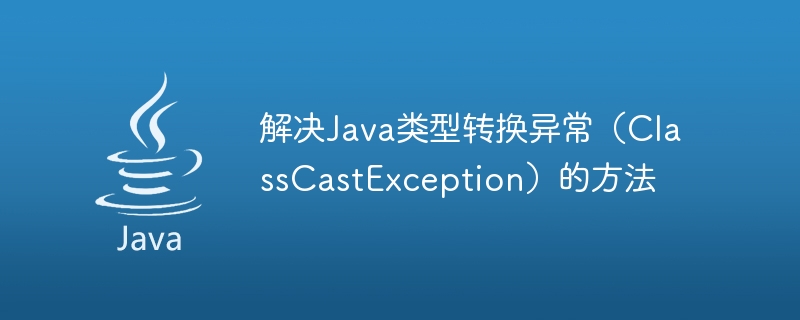

Methods to solve Java type conversion exception (ClassCastException)
In Java development, type conversion is a common operation. Sometimes we need to convert an object from one type to another, but if the conversion is incorrect, a ClassCastException will be thrown. This exception can occur at runtime, causing the program to crash or behave incorrectly.
To solve this problem, we need to follow some best practices. Here are some methods and tips that can help you avoid or handle ClassCastException exceptions.
Object obj = new Integer(5);
if (obj instanceof Integer) {
// 安全转换
Integer num = (Integer) obj;
System.out.println("转换成功:" + num);
} else {
System.out.println("对象不是Integer类型");
}In this example, we first checked whether obj is an instance of type Integer. If so, we perform a type conversion and print the converted value. Otherwise, we print an error message.
try {
Object obj = new Integer(5);
String str = (String) obj;
System.out.println("转换成功:" + str);
} catch (ClassCastException e) {
System.out.println("类型转换异常:" + e.getMessage());
// 执行其他操作
}In this example, we are trying to convert an integer object to string type. Due to type mismatch, ClassCastException will be thrown. In the catch block, we print the exception message and perform other operations.
ArrayList list = new ArrayList();
list.add("Hello");
list.add(5);
for (Object obj : list) {
String str = (String) obj; // 在这里会抛出ClassCastException异常
System.out.println("值:" + str);
}In this example, we are storing a String object and an Integer object in an ArrayList. We then try to convert these objects to string type and print their values. But since the array contains integer objects, trying to convert them to string type will result in an exception.
To avoid this situation, we should use generic collections to ensure that only objects of the same type are stored in the collection.
Summary:
ClassCastException exceptions may occur frequently in Java development, but we can take some methods to avoid or deal with it. First, we can use the instanceof operator to do type checking and perform conversions before determining the type of the object. If we cannot determine the type of the object in advance, use a try-catch block to catch the exception and perform other operations. Finally, to avoid confusing objects of different types, you can use generic collections to ensure that only objects of the same type are stored in the collection. Through these methods and techniques, we can better handle type conversion exceptions and improve the reliability and robustness of the code.
The above is the detailed content of Methods to solve Java type conversion exception (ClassCastException). For more information, please follow other related articles on the PHP Chinese website!




